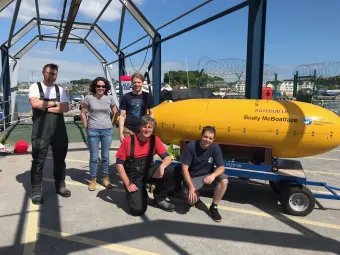
Engineers and scientists from the National Oceanography Centre (NOC) have successfully recovered the renowned state-of-the-art underwater robot, 'Boaty McBoatface'.
This latest expedition is the longest journey undertaken by the Autosub Long Range (ALR). The recovery from Thales Turnchapel Wharf in Plymouth was also where it completed its most recent deployment out in the Southwest Approaches.
The deployment focused on proving the endurance and data gathering capabilities of Boaty McBoatface, to ensure it is prepared for scientific deployments anywhere in the ocean. Over a period of five weeks the autonomous vehicle travelled from Plymouth out to the continental shelf edge south of Ireland and back to Plymouth, covering a distance of almost 2,000km while venturing to depths of over 1,000m. Unaccompanied by a support vessel, Boaty was surfacing roughly every 24 hours to telemeter sensor data and receive new piloting instructions from the team in Southampton.
Capable of being deployed for up to three months, the fleet of six Autosub Long Range (ALRs) vehicles are opening new opportunities for low-cost shore-launch scientific missions and under-ice exploration. Development of these long-range, low-power, robots will also allow scientists to research areas that could not previously be reached by ships, such as unexplored and technologically challenging environments such as under-ice and the deep-ocean. The Plymouth deployment demonstrates new technologies that will be used to deliver planned future ground-breaking science expeditions, such as exploring under the sea ice in the Weddell Sea or monitoring the long-term environmental impacts of decommissioned oil and gas infrastructure.
The NOC has been leading the UK’s road to net zero oceanographic capability with the Marine Autonomous Robotic Systems (MARS) Development Group. Scientists and engineers at the NOC are using autonomous underwater vehicles to provide information and data to assess the impact that investments into clean energy may have on coastal ecosystems, such as the impact of offshore wind farms in areas that the UK depends on for fish, transport, leisure & wellbeing, as well as energy extraction.
Dr Alex Phillips, Head of the MARS Development Group at the National Oceanography Centre said: “This latest expedition is the longest journey undertaken by Boaty and marks a number of significant achievements for the Oceanids development programme. The ALR has managed to follow a challenging and hazardous pathway from the UK shore out to the continental shelf break, covering a distance of several thousand kilometres before making a safe return to Plymouth. During this time, it has dived to depths over 1,000m, collecting data that informs us of the changing currents, structure and productivity of UK seas.”
Dr Matthew Palmer, Chief Scientist of Marine Autonomous Robotic Systems at the National Oceanography Centre said: “Although a technical trial, Boaty has collected information that will help link how physical conditions and changes in UK waters impact marine ecosystems and ocean health. New state-of-the-art sensors will monitor currents, temperature, changes in the seabed, and how phytoplankton and oxygen levels change over space and time. The long-range capability from shore to deep ocean will also contribute to our understanding of how short and long-term changes in our oceans and the UK’s coastal seas are a result of human actions such as pollution, fishing, and industry, as well as climate change factors.”
This mission presents a new level of capability for low-carbon technology to meet global marine monitoring requirements alongside UK Government targets. It delivers a highly capable autonomous submarine that can deliver data for scientific research, environmental monitoring, meeting licensing requirements and undertaking industry surveys, at a fraction of the cost of using specialist ships, showcasing autonomous underwater vehicles as a potential solution to governments and industry partners aiming to meet net-zero capability. The fleet of robots also offers a realistic solution to sustainable management of the marine environment to nations unable to invest in traditional ship based monitoring programmes, contributing to UN Sustainable Development Goals.
“We’re developing an exceptional oceanographic capability with autonomous platforms that will be a key enabler for future marine scientific research,” Matthew continued. “Technology is at the heart of transitioning to a carbon neutral research capability. These achievements mark the success of the NOC-led programmes in delivering world-leading robots and autonomous solutions that present a major step towards meeting the UK’s Net-Zero and Digital Environment targets.”